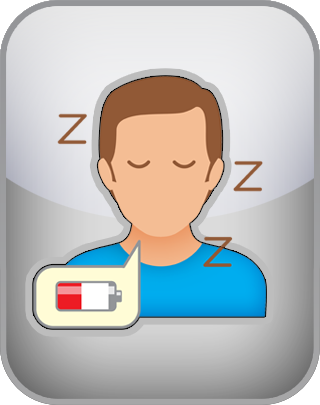Fatigue Assessment Test
Fatigue represents a significant challenge across various (chronic) illnesses, standing out as the most commonly reported symptom and universally acknowledged as a debilitating condition. It is characterized by feelings of exhaustion, aversion to current activities, and a reluctance to persist, or by a gradual disengagement from environmental stimuli and tasks at hand.
Do you suffer from fatigue? To take the test, indicate your answers below.
Question 1 of 10
I get tired very quickly.
| Disagree | Agree |
NEXT
The IDRlabs Fatigue Test was developed by IDRlabs on the basis of the scientifically-devised instrument, the Fatigue Assessment Scale (FAS).
The Fatigue Assessment Scale (FAS) is a tool used to measure and assess fatigue levels in individuals. Developed by Michielsen et al. in 2003, the FAS is a self-report questionnaire designed to evaluate the severity and impact of fatigue on various aspects of daily life.
The scale consists of 10 items, each describing different aspects of fatigue experience, such as physical and mental fatigue, motivation, and activity level. Respondents rate the extent to which each statement applies to them over the past week on a five-point Likert scale ranging from “strongly disagree” to “strongly agree.”
The total score on the FAS provides a quantitative measure of fatigue severity, with higher scores indicating more severe fatigue. It can be used in clinical settings to assess the impact of fatigue on patients’ functioning and quality of life, as well as in research studies to measure changes in fatigue levels over time or in response to interventions.
The FAS has been validated in various populations, including patients with chronic fatigue syndrome, multiple sclerosis, cancer, and other chronic illnesses, making it a versatile tool for assessing fatigue across different conditions.
The Fatigue Assessment Scale (FAS) is a widely used instrument that offers a structured approach to evaluating fatigue, a complex and multifaceted symptom experienced by individuals across a spectrum of health conditions. By encompassing diverse aspects of fatigue, including physical, cognitive, and motivational dimensions, the FAS provides a comprehensive assessment of the subjective experience of fatigue.
The scale's brevity and simplicity make it easy to administer and interpret, enhancing its utility in both clinical and research settings. Clinicians can use the FAS to monitor changes in fatigue severity over time, track treatment progress, and tailor interventions to address specific aspects of fatigue that may be most problematic for individual patients. Researchers can employ the FAS to measure fatigue outcomes in intervention studies, examine the prevalence and impact of fatigue in different populations, and explore factors contributing to variations in fatigue severity.
Moreover, the FAS has been translated into multiple languages and validated in diverse cultural contexts, ensuring its applicability across global populations. Its widespread use and validation in various patient groups underscore its reliability and validity as a tool for assessing fatigue, facilitating comparisons across studies, and enabling clinicians and researchers to gain deeper insights into the nature and implications of this pervasive symptom.
Free online quizzes such as the present test do not provide professional assessments or recommendations of any kind; the test is provided entirely “as-is.” For more information about any of our online tests and quizzes, please consult our Terms of Service.

